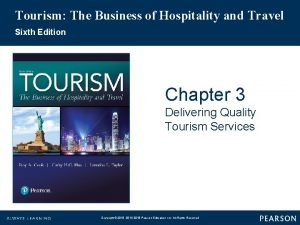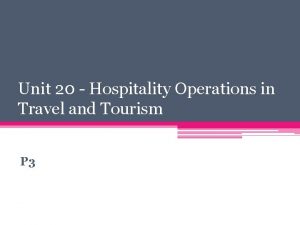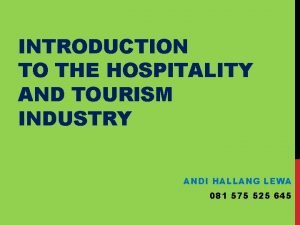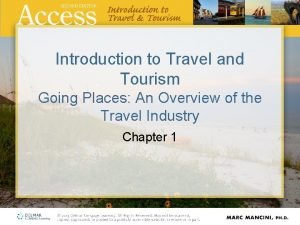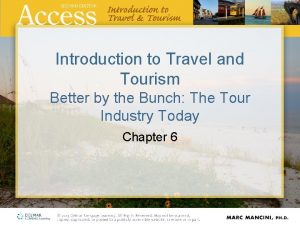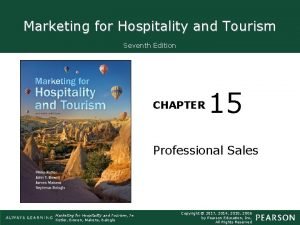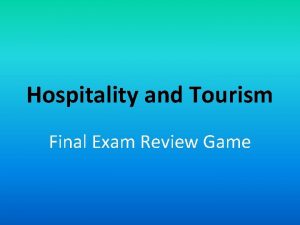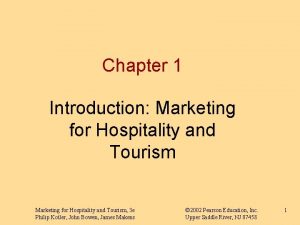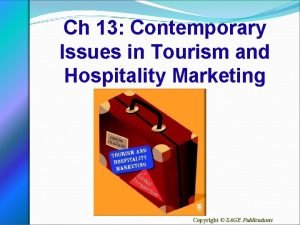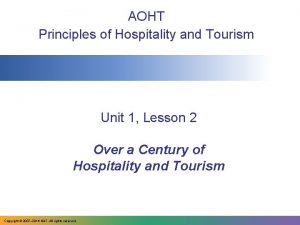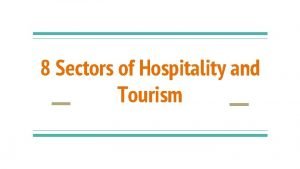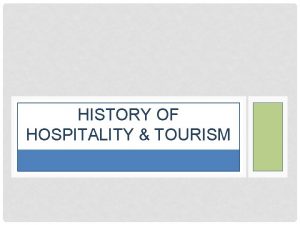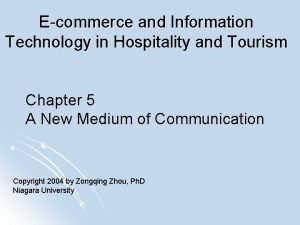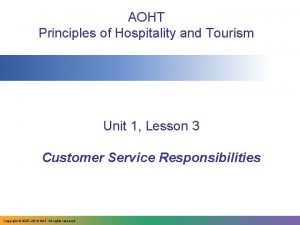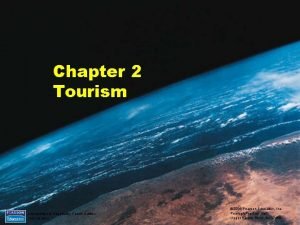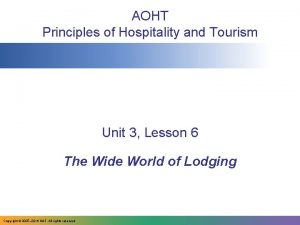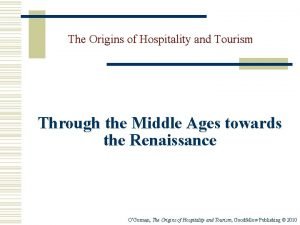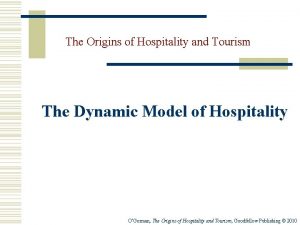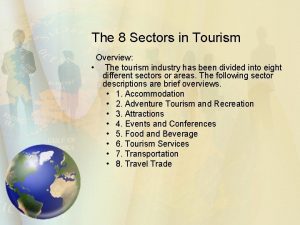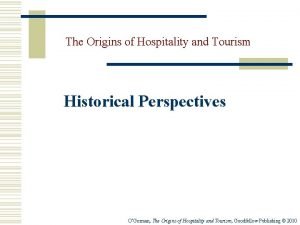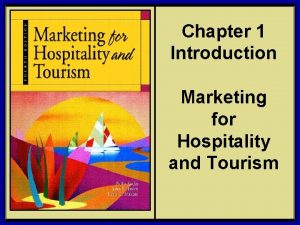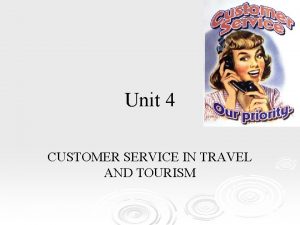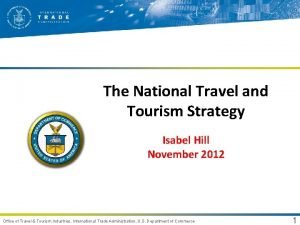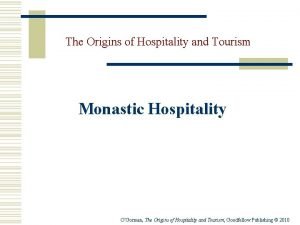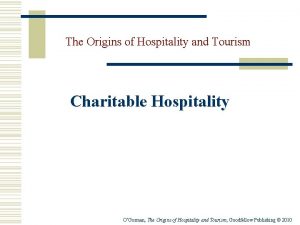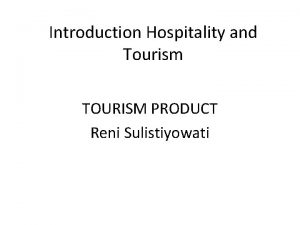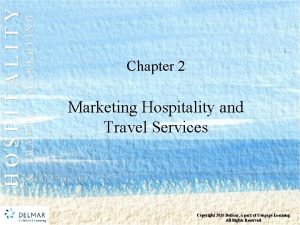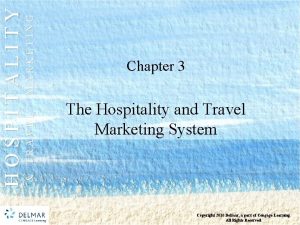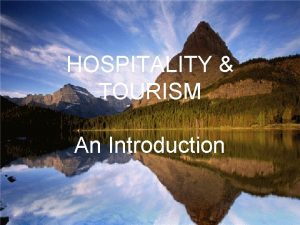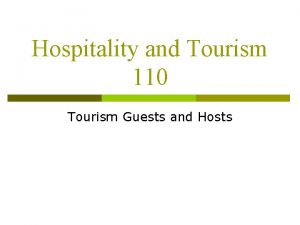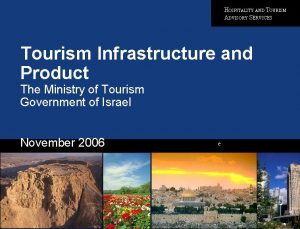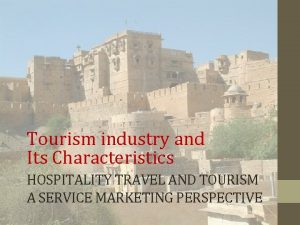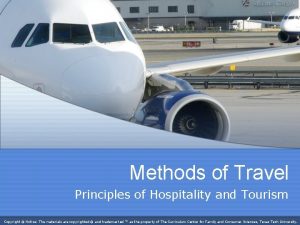Introduction to Travel Tourism and Hospitality Management PRESENTED






























- Slides: 30

Introduction to Travel, Tourism and Hospitality Management PRESENTED BY SADEKE SMITH COLBOURNE COLLEGE MASTER PLAN & SUSTAINABLE TOURISM DEVELOPMENT

Introduction The purpose of this presentation is explain and discuss how proper planning is essential to the development and mitigation of the devastating challenges that affects Jamaica in its pursuit of sustainable tourism development. .

Approach and Methodology This research was conducted using primary data in the form of elite interviews and secondary data including internet sources, case studies and literature.

Overview of Jamaica Tourism has long been a mainstay of the Jamaican economy. However, prior to 1890, the industry was not organized. Available infrastructure was inadequate and much needed services were unavailable. The industry at that time largely comprised a number of lodging houses and inns which numbered in excess of 1400 in 1830.

Overview of Jamaica However, with the passing of the Hotels Act of 1890, the government encouraged the building of accommodation for the Great Exhibition of 1891. Hotels were opened in Kingston, Spanish Town, Moneague, Mandeville and Port Antonio. § Today, tourism is one of Jamaica’s leading industries. More than three million visitors are welcomed to our shores each year. The elements of the tourism product include accommodation, transportation, attractions and tours, dining and entertainment (inclusive of festivals and events), and the support services. § CITED (JTB 2006)

What is Tourism? Defined by Jafari, (1977) is the study of man away from his usual habitat, of the industry which responds to his needs, and of the impacts that both he and the industry have on the host socio-cultural, economic and physical environment. N. B tourism undoubtedly shares a great level of interconnectivity with most elements of the host destination.

What is planning? Destination planning involves a number of steps and activities that include designing, financing, developing, and marketing of a destination to attract the visitors. It requires cooperation and commitment of a number of different segments including government and community leaders, architects, engineers, investors, economists, environmentalists, and others to ensure the sustainability of a destination.

Master plan of Jamaica The objective of the Master Plan is to move the industry on to a path of sustainability. The Plan seeks to guide the industry’s development over the next decade by creating a strategic vision for its growth and development and establishing an enabling environment to help it realize that vision. It is a national Master Plan and hence deals with the broad thrust of policy and strategy and only the main initiatives and investments required to help fulfill the potential of the industry.

What is Sustainable Development? This is development that meets the needs of the present generation without compromising the ability of future generations to meet their own needs. (WCED, Our Common Future, 1987)

Principles of Sustainability Inter-generational equity Intra-generational equity Public participation Environmental protection Addressing risk and uncertainty Accountability

What is Sustainable Tourism? This is the optimal use of the natural and cultural resources for national development on an equitable and self-sustaining basis to provide a unique visitor experience and an improved quality of life through partnerships among governments, the private sector and communities. Jafari, J. (1990)

Why sustainable Tourism? Tourism competes for resources -renewable and nonrenewal resources Main economic activities for many countries It contributes to increasing inequalities and disparities in societies. The needs of locals and tourists are often different and in conflict

Why sustainable Tourism contd? Locals often get left out of decision making There is a poor definition of tourism, especially in planning

Economic Sustainability This is the efficient use of resources resulting in the profitability in both immediate and long term development.

Environmental Sustainability Encompasses, for example keeping population densities below the carrying capacity of a region, facilitating the renewal of renewable resources, conserving and establishing priorities for the use of non-renewable resources, and keeping environmental impact below the level required to allow affected systems to recover and continue to evolve. Jafari, J. (1998).

Cultural Sustainability This is the developing, renewing and maintaining human cultures that create positive, enduring relationship with other peoples and the natural world.

Social Sustainability This entails a strong focus on youth as well as providing opportunities for and interactions between several sectors of the community. These include youth, people with specials needs, the aged community, unemployed individuals, families, travellers, businesses, volunteers and the wider community all benefit from being involved with the operations.

Challenges of Achieving Economic Sustainability Leakages Infrastructure cost Increase in Prices Economic Dependence of local communities on the industry Seasonal character of jobs

Challenges of Environmental Sustainability Depletion of natural resources Lack of follow up policies by governments Pollution ( noise and air). Site selection is made without major consideration of the environmental and cultural sustainability of the site. Trampling of vegetation Solid waste and littering Construction- lead to the loss of wild life and scenery.

Challenges of socio-cultural sustainability Tourism may contribute to the generation gap between the young who adopt the way of tourists and old who prefer tradition The destruction of pre-historic sites to facilitate tourist derived development Overcrowding of an area Tourism is a service industry which involves lots of contact and serving of tourist which may have be reminiscent of slavery Loss of authenticity

Socio-cultural challenges contd Change or loss of indigenous identity and values commodification standardization Adaptation to tourist demands Culture clashes and economic inequality

Socio-cultural challenges contd Physical influences causing social stress Resource use conflicts Cultural deterioration Ethical issues Crime generation

Strategies of economic sustainability Form partnerships throughout the entire supply chain from micro-sized local business to multinational organizations. Use internationally approved and reviewed guidelines for training and certification. Promote among clients an ethical and environmentally conscious behaviour. Diversify the products by developing a wide range of tourist activities. Contribute some of the income generated to assist in training, ethical marketing and product development. Provide financial incentives for businesses to adopt sustainability principles

Strategies for Environmental sustainability Codes of practices should be established for tourism at all levels. Guidelines for tourism operations, impact assessment and monitoring of cumulative impacts should be established. Formulate national, regional and local tourism politics and development strategies that are consistent with overall objectives of sustainable development. Institute baseline environmental impact assessment studies

Environmental strategies contd Ensure that the design, planning, development and operation of facilities incorporate sustainability principles. Ensure tourism in protected areas, such as national parks, is incorporated into and subject to sound management plans. Monitor and conduct research on actual impacts of tourism. Identify acceptable behaviour among tourist. Promote responsible tourism behaviour

Strategies for socio- cultural sustainability Tourism should be initiated with the help of broad based community input. Education and training programs to improve and manage heritage and natural resources should be established. Conserve cultural diversity. Respect land property rights of traditional inhabitants.

Strategies for socio-cultural sustainability contd Guarantee the protection of nature, local and the indigenous cultures and especially traditional knowledge. . The community should maintain control over tourism development. Tourism should provide quality employment to community residents. Encourage business to minimize negative effects on local communities and contribute positively to them. Ensure an equitable distribution of financial benefits throughout the entire supply chain.

Recommendations for sustainability of tourism Implementation of protective policies Harmonization of sectors in the decision making process Diversification of tourism product Shared vision among all affected parties Following the national tourism objectives and Master plan Implementing a regional tourism body that acts as an independent regulator.

Recommendations for the sustainability of tourism contd Provide financial incentives for local business to enter tourism. Improve local human resource capacity Strengthen, nature and encourage the community’s ability to maintain and use traditional skills. Educate tourists about desirable and acceptable behaviour

References Jafar, J. (1977). The Role of Tourism in the Socioeconomic Transformation of Developing Countries. Ithaca NY: Cornell University. M. S. Thesis Jafari, J. (1990). “Research and Scholarship: The Basis of Tourism Education. ” Journal of Tourism Studies, 1(1): 33– 41. Jafari, J. (1998). “Tourism Assuming Its Scholarly Position. A Retrospective and Prospective Overview”. Retrieved from (http: //www. uib. es/honoris/). (http: //www. jtbonline. org/statistics/JTB%20 Annual%20 Reports/ANN %20 REPORT%202006 -07. pdf). (www. fao. org/ag/wfe 2005/glossary_en. htm). (www. Jtb. org).
 Tourism the business of hospitality and travel
Tourism the business of hospitality and travel John r walker introduction to hospitality management
John r walker introduction to hospitality management The interrelated nature of hospitality and tourism
The interrelated nature of hospitality and tourism Unit 20 hospitality operations in travel and tourism
Unit 20 hospitality operations in travel and tourism Tourism industry definition
Tourism industry definition Introduction to travel and tourism
Introduction to travel and tourism An introduction to travel and tourism
An introduction to travel and tourism What are the 8 sectors of tourism industry
What are the 8 sectors of tourism industry Marketing for hospitality and tourism 7th edition ppt
Marketing for hospitality and tourism 7th edition ppt Hospitality and tourism final exam
Hospitality and tourism final exam Internal marketing in hotel industry
Internal marketing in hotel industry Hospitality marketing
Hospitality marketing Contemporary issues in hospitality industry
Contemporary issues in hospitality industry Principles of hospitality and tourism lesson plans
Principles of hospitality and tourism lesson plans Sectors of hospitality
Sectors of hospitality History of hospitality and tourism industry
History of hospitality and tourism industry E commerce tools in tourism and hospitality
E commerce tools in tourism and hospitality Aoht principles of hospitality and tourism
Aoht principles of hospitality and tourism Chapter 2 hospitality and tourism
Chapter 2 hospitality and tourism Aoht principles of hospitality and tourism
Aoht principles of hospitality and tourism The origins of hospitality and tourism
The origins of hospitality and tourism The origins of hospitality and tourism
The origins of hospitality and tourism Eight sectors of tourism
Eight sectors of tourism Pineapple tradition
Pineapple tradition The origins of hospitality and tourism
The origins of hospitality and tourism Introduction to hospitality marketing
Introduction to hospitality marketing Hospitality and travel marketing
Hospitality and travel marketing Stated and unstated needs travel and tourism
Stated and unstated needs travel and tourism Introduction to hospitality marketing
Introduction to hospitality marketing John r walker introduction to hospitality management
John r walker introduction to hospitality management Isabel hill commerce
Isabel hill commerce
